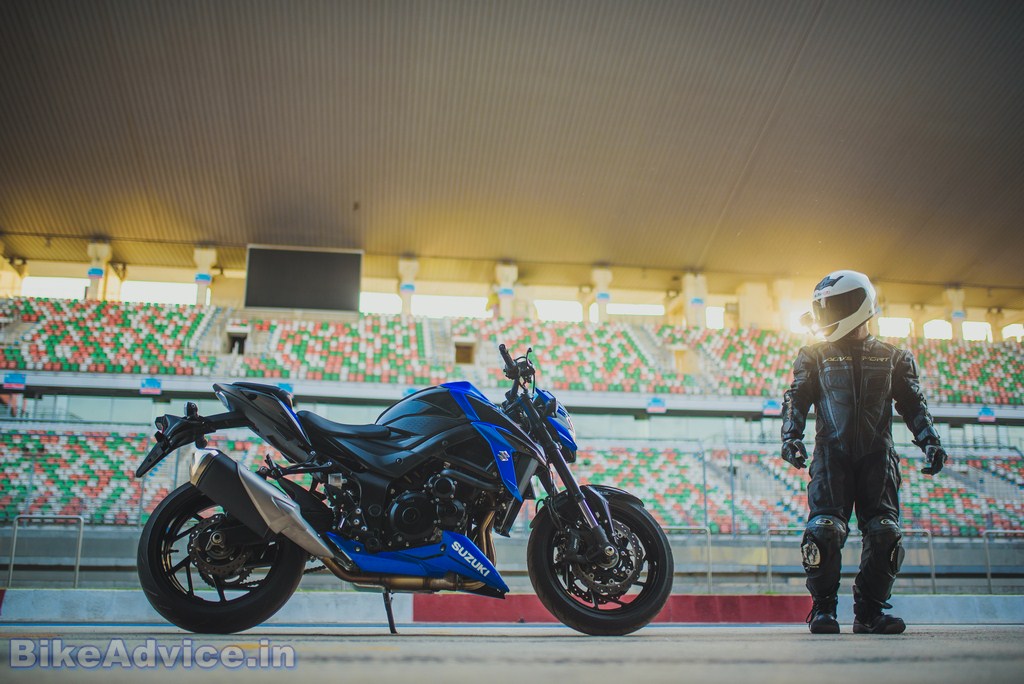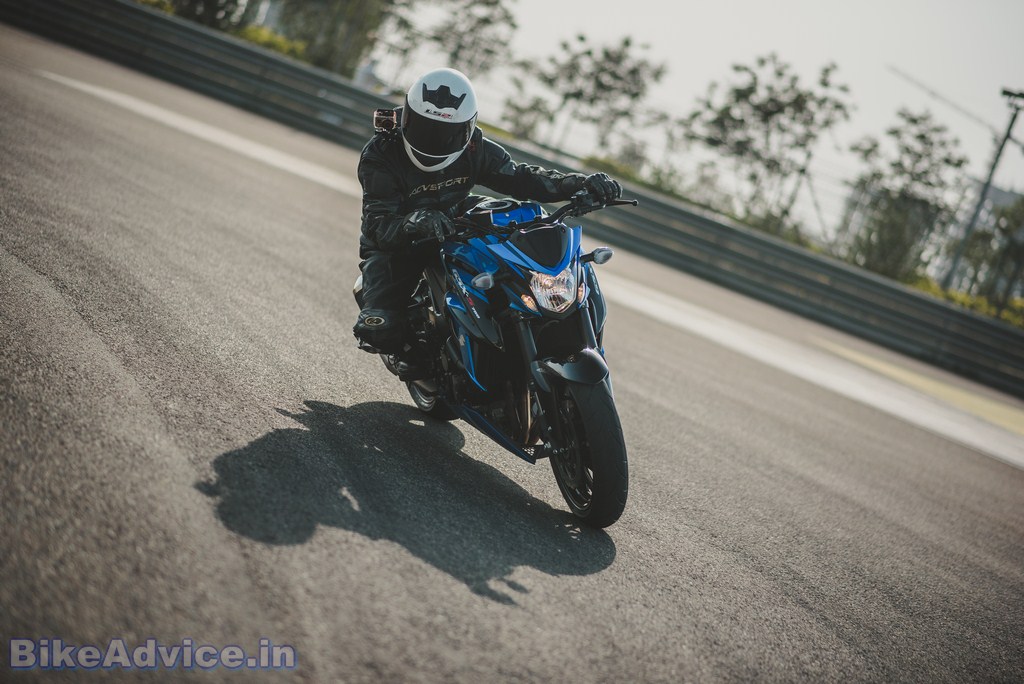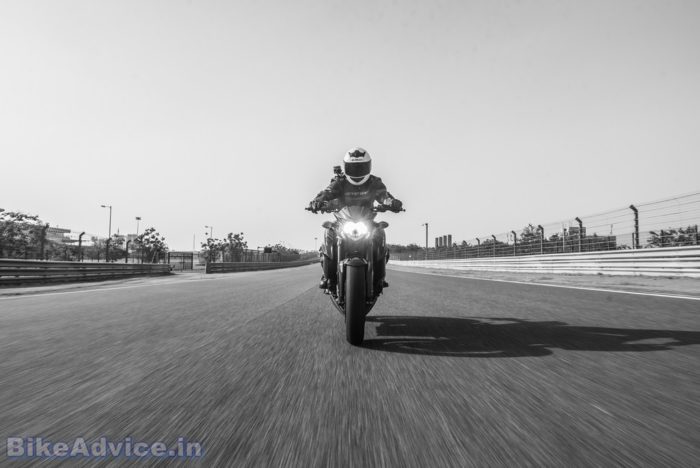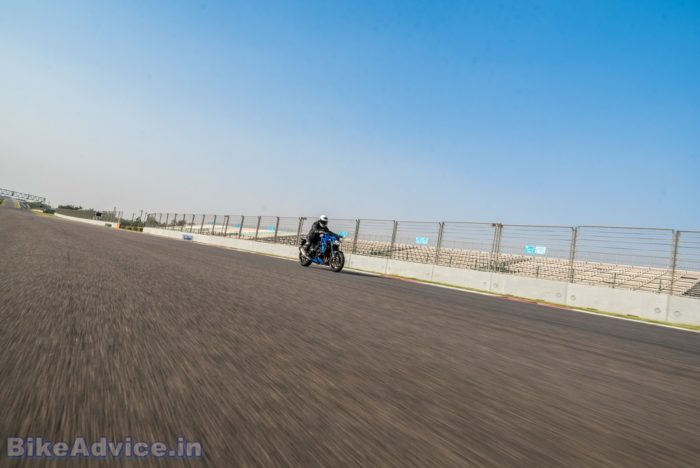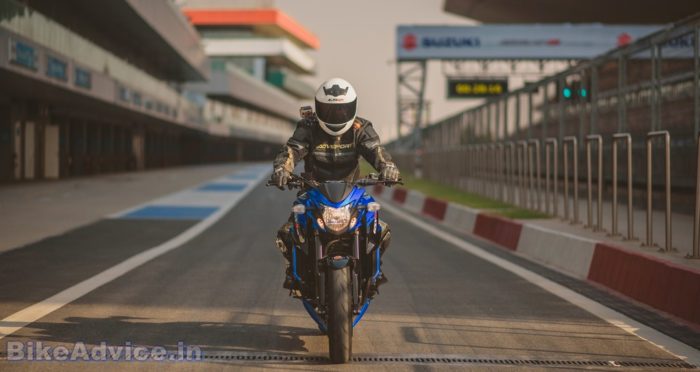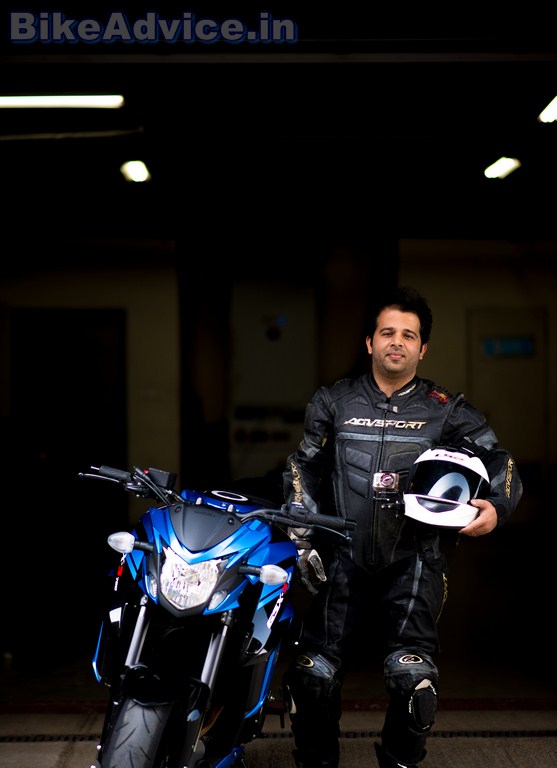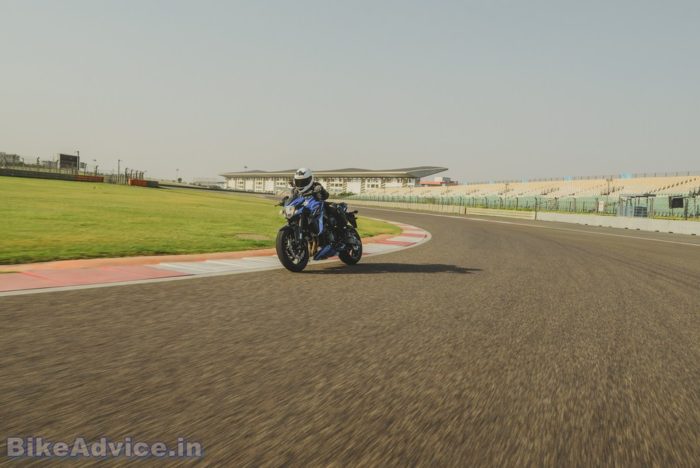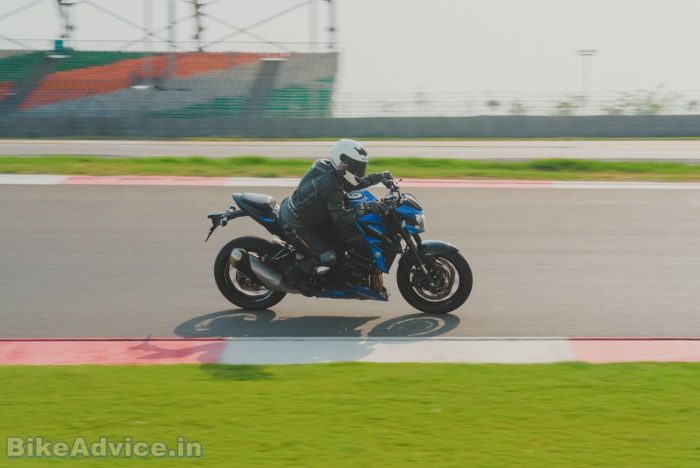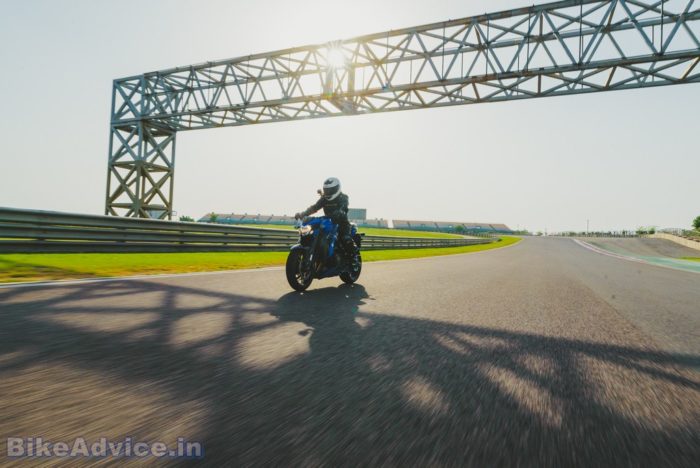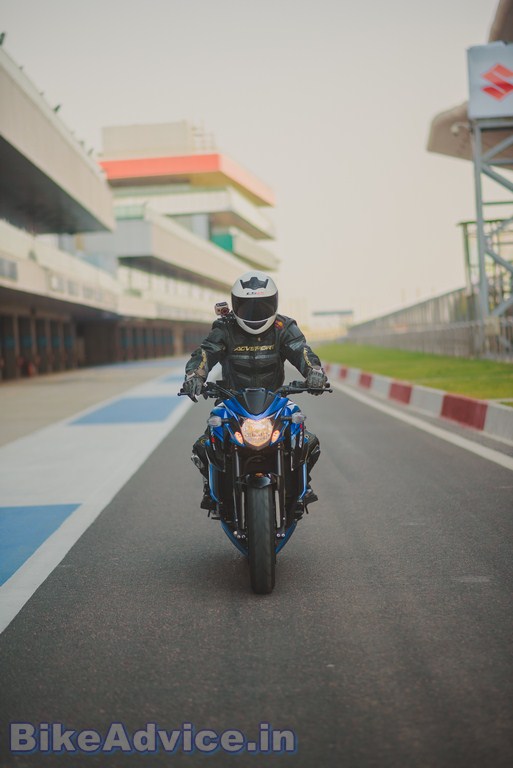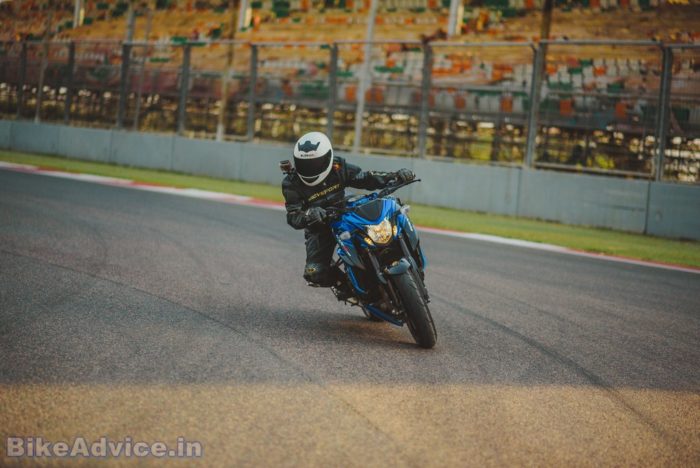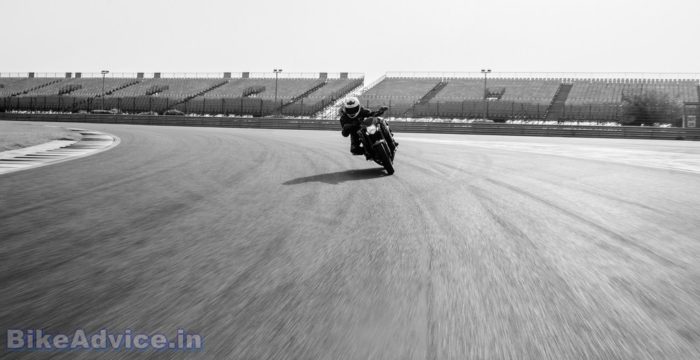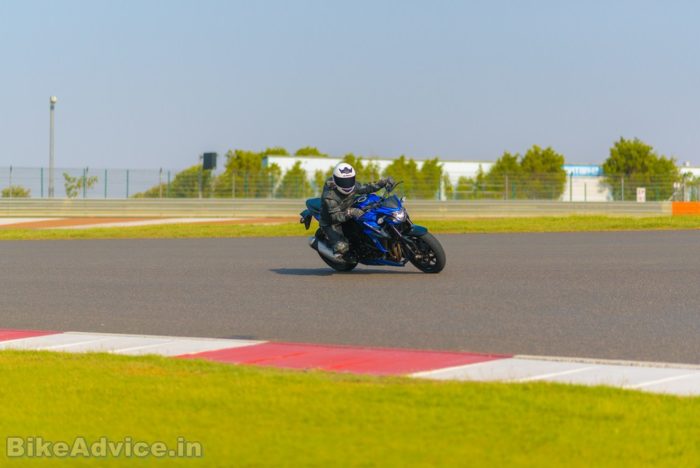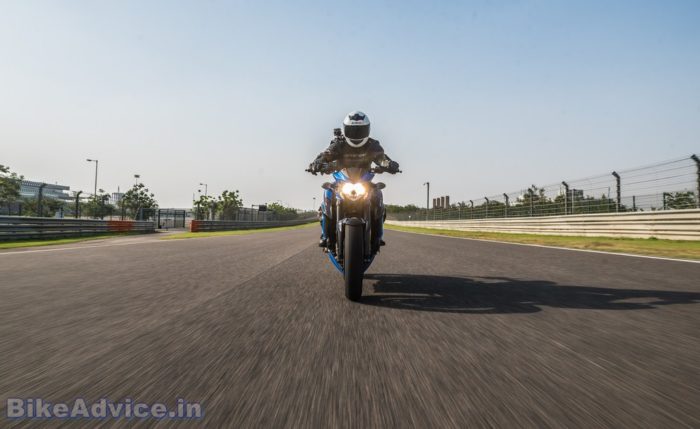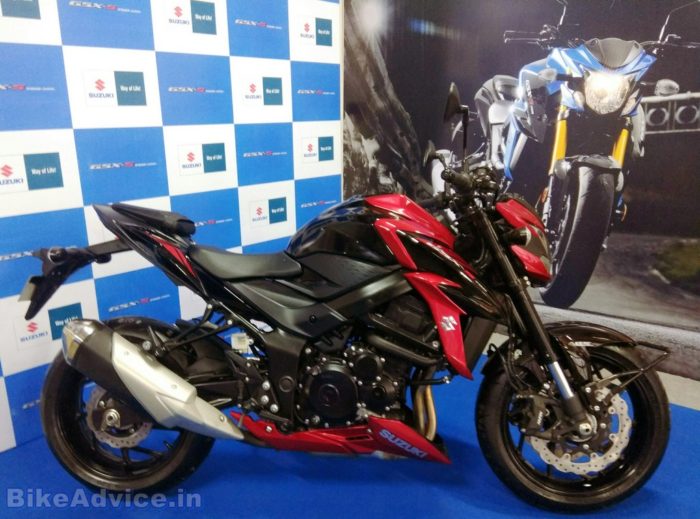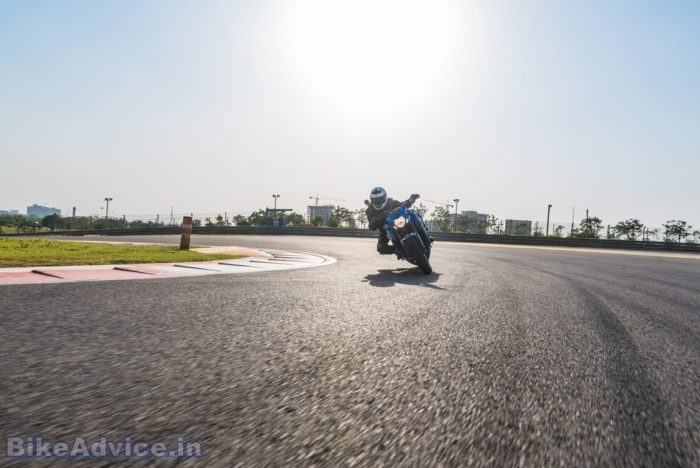Suzuki GSX-S750 Review – Words: Syed Shiraz | Photos: Himanshu Sharma
For as long as I remember, when it came to buying a 100-plus horsepower sportbike in India, in under ten lakh rupees on road, your choices were limited to just one or two motorcycles at best. That changed on 24 April 2018 with the launch of this – the Suzuki GSX-S750 (INR 7.45 lakh ex-showroom, Delhi)! Okay, not all has changed because even now you again have just two sportbikes in the sub 10-lakh-rupee slab that produce more than a hundred horsepower – the S750, and the Kawasaki Z900. The Street Triple S used to play in the segment until recently too, but the chaps at Triumph have gone berserk with its pricing. The ex-showroom price of the entry level Triple S is now INR 9.33 lakh, which frankly is another way of saying, “hey, we do not want to sell it anymore!” It was INR 9.2 lakh until last week, so I wonder whether the company has come under the central government.
Anyway, if you uncheck the hundred hp filter (no pun intended), you have the Monster 797 and Honda CBR 650F too vying for your attention. We have tested all the motorcycles mentioned here, save for the Z900 as Kawasaki doesn’t have media units in Delhi. Still, wherever necessary, this Suzuki GSX-S750 review will include references to all the aforementioned motorcycles for perspective, thereby giving you a fair idea of how the latest Suzuki performs in comparison. We rode it at the Buddh International Circuit (you may check the sighting lap here), so while a full road test later on will give you a definite verdict, even right now I shall try and tell you as much as I can, to help you make an informed decision, if you just cannot wait for the road test review.
Suzuki GSX-S750 Review – Design & Ergonomics
“Restrained aggression” is how I would define the philosophy behind this motorcycle’s design. The form isn’t intimidating, but clearly sends a vibe that you just can’t take it for granted. It’s like that well-built handsome bloke who means no harm, but you know that he is not someone you would want to mess with.
I love how it looks, and, thanks to the success of the smaller Gixxer, the 750 won’t be attracting undue attention in the parking lots. Therefore, as an owner, I would be much relieved to know that people won’t be sitting on my bike to click selfies. All eyes would be on the bike when I thumb the starter though, but I would be long gone before they gather the courage to ask me to let them indulge in their shallow materialistic pleasures.
Talking about pleasure, you’ll love the comfortable seat and overall ergonomics of this Gixxer. Okay, a seat height of 820 mm warrants a minimum height requirement of 5’5”, but you should be able to tip-toe on thicker-sole boots if, like me, you’re shorter than that.
You sit fairly upright on the GSX-S750 with just a hint of forward bias. Perfect! I cannot comment on the pillion comfort right now; wait for the road test if you have a joint bank account with your wife.
Suzuki GSX-S750 Review – Performance
First things first – this is the BEST SOUNDING MOTORCYCLE in the segment! It is so good that even the worst of dorks won’t get an aftermarket exhaust system for this one. The best part is that unlike most middleweights, you do not have to wring the Gixxer’s throttle to the maximum to hear that sound – it sounds glorious right from the word GO! And that sound gets better and better as the revs rise. If you’re nursing a broken heart, get this bike right away; it will expedite the healing process. Heck, I wasn’t feeling too well in the morning, but came back feeling better despite riding in leathers in Delhi’s scorching heat.
And heat is what this Gixxer’s competitors must be feeling right now because as far as first impressions go, the GSX-S750 has made a stellar one, which makes me feel that Suzuki will now own this segment! The engine is smooth, without getting boring, and the power delivery linear, without getting unexciting. The GSX-S750 is a fast bike, gentlemen, and to see ‘how fast’, you may check the 10-second clip below.
If you noticed, I was still a thousand revs away from the redline, which means that you may add around 15 to 20 km/h more to the top speed managed by yours truly above and THAT would be this 750’s top speed as per the speedometer. Yes, it’s faster than the Street Triple S. I think the Suzuki might be the quicker bike too, and I can’t wait to get the bike for a full-fledged road test and do the acceleration runs. Also, just so you know, none of the middleweights mentioned in this story power-wheelie, and though the 750 is no exception, it is the easiest to wheelie in its segment.
electron
Suzuki GSX-S750 Review – Ride & Handling
You might have also noticed that I had switched the Traction Control off (after swallowing an imaginary “I Am Brave” pill). See, the 750 gets the instrument cluster and electronics from the GSX-S1000, so while I didn’t have the courage to switch the traction control off on the S1000 in unpredictable road conditions, on the 750, on the racetrack, I straightaway started in the least intrusive mode (Level 1) and switched it off towards the end of the session. Such is the grip provided by the Bridgestone Battlax Hypersport S21s that I never had a hairy moment at the track even with the TC off.
That grip makes the job of the fantastic brakes even easier, allowing me to brake later and harder at the end of the two straights at the BIC. The ABS did not kick in even once, which again tells you a lot about the astounding grip of the tyres. I must also mention that being in the second last slot of the day (post 4 pm), we got the bikes that were being continually hammered since 6 in the morning, but there was still no brake fade at all!
Hawk-eyed readers would remember that I had found the Street Triple’s brakes a tad underwhelming. The Suzuki gets exactly the same front brakes as the Triumph, but with one crucial difference – number of pistons. The Triple’s front anchors are summoned by just two pistons, whereas the GSX-S750 gets four of them. The result? Terrific bite and feel!
It’s again on the straights (especially the long back straight which is not flat like the Start/Finish straight) that I noticed how incredibly stable the motorcycle is even post the double ton! The longest wheelbase in class sure has its benefits. It remains equally stable in corners, but I was pleasantly surprised at how easy it is to flick it into them and pick it back up! I say ‘surprised’ because with a 213 kg kerb weight, and the longest-in-segment wheelbase, I had thought it to be a handful in corners. That’s a fine testimonial of how NOT the spec sheets tell the complete story. Moreover, it does not feel top heavy, and has the best in class ground clearance of 135 mm too!
The above paragraph should tell you that it would be equally good in the city as well as on the highways. The ride quality on the track was nothing short of excellent, of course, but how it would perform on the road is something that can only be determined once I ride it on the road. That said, the stock settings felt perfect—neither soft, nor hard—for my body weight (58 kg), and since the KYB suspension at both ends is adjustable for preload, I reckon finding a sweet spot won’t be difficult for heavier riders.
Suzuki GSX-S750 Review – Electronics
I almost forgot to tell you about Suzuki’s AMT (yes, you now have AMT in bikes too!) package or Anti Moron Technology in other words. This package includes two features: Easy Start System, and Low RPM Assist. I am sure you must have come across many in your neighbourhood whose incessant cranks on their scoots in the morning make you wish they were banned for life from coming near a motorized vehicle, and then there are people who would let their engine idle to eternity at stop signals, but stall it the moment the light turns green! You do come across such people, right?
If your answer is yes, then don’t worry, Suzuki (and not Tesla) is trying to make this world a better place to live and ride in, and the AMT package has been designed keeping the aforementioned people in mind. So you push the starter button once, and the bike’s 32-bit ECM would determine how long it would take the starter motor to bring the engine to life. You don’t have to keep pushing it like a psycho boyfriend ringing his ex’s doorbell. That’s Easy Start System for you.
The Low Rpm Assist feature increases the rpm if the user doesn’t give enough gas after selecting first gear and releasing the clutch. That essentially means you can take your right hand completely off the throttle and still be able to start moving – the bike won’t stall! In fact, this feature will help even seasoned riders too as it is not rare to find yourself in chock-a-block conditions where you sometimes end up stalling the bike! Not only will it save you from embarrassment, but also from getting rear-ended by overzealous pizza delivery guys and such. Tight U-turns will also be a lot safer on this one.
And no, there is no AMT or anything like that; the bike has a slick 6-speed gearbox. The rest of the features, functions, and analogies are absolutely true though.
Suzuki GSX-S750 Review – Fuel Efficiency & Other Tidbits
Suzuki claim a fuel efficiency figure of 20.4 km/l and I don’t doubt it a bit because I not only got 16.6 km/l from the mad S1000, I’d even said that a considerate right hand might see 20 km/l. By that yardstick, the S750 might even deliver better than promised!
Suzuki’s product development team also told me that save for the saree guard and that horrid front registration plate holder that together take the weight up to 215 kg, it’s exactly the same bike that is being sold globally.
It’s just that the even sinister looking all-black variant (sold at a premium globally as the GSX-S750Z) hasn’t made it to our shores yet. My money is on the blue anyway, so I ain’t complaining. But it would really help Suzuki to get that colour to India too. There would be a lot of buyers for that colour!
mo
Suzuki GSX-S750 Review – Verdict
See, though I have included the Monster 797 in my comparison chart below, the primary competition of the S750 comprises the Z900 and Street Triple S. The Triumph is a lovely machine but the only real world advantage it has over the Suzuki is that it would be a smidgeon easier to manage in the city owing to its less weight and shorter saddle height.
The Suzuki is faster; has better electronics; sounds better; rides and handles just as fine if not better; has better brakes, and is phenomenal value for money. The Z900 is also great value for money, but the lack of traction control makes it suitable for expert riders only. And even for such riders, the high perceived/real maintenance cost and the indifferent attitude of Kawasaki India’s new management form a big deterrent. Clearly, the GSX-S750 it is, then. Time to get thick-sole boots, and a loan.
GSX-S750 vs Z900 vs Monster 797 vs Street Triple S
| Price & Specs | Suzuki GSX-S750 | Kawasaki Z900 | Ducati Monster 797 | Triumph Street Triple S |
| Price (ex-showroom) | 7.46 lakh | 7.69 lakh | 8.03 lakh | 9.33 lakh |
| Engine | 749 cc, inline-4 | 948 cc, inline-4 | 803 cc, L-twin | 765 cc inline-3 |
| HP | 112.6 @ 10,500 rpm | 123 @9,500 rpm | 73 hp @ 8,250 rpm | 111.5 @11,250 rpm |
| Torque | 81 Nm @ 9,000 rpm | 98.6 Nm @ 7,700 rpm | 67 Nm @ 5,750 rpm | 73 Nm @10,421 rpm |
| Compression Ratio | 12.3:1 | 11.8:1 | 11.0:1 | 12.65:1 |
| Gearbox | 6-Speed | 6-Speed | 6-Speed | 6-Speed |
| Rake/Trail | 25.2 / 104 mm | 24.5 / 103 mm | 24 / 90 mm | 24.8 / 104.3 |
| Wheelbase | 1455 mm | 1450 mm | 1435 mm | 1410 mm |
| Length | 2125 mm | 2065 mm | NA | NA |
| GC | 135 mm | 130 mm | NA (should be more than or at least equal to 135 mm) | NA (should be less than or equal to 130 mm) |
| Kerb Weight | 215 kg | 210 kg | 193 kg | 190 kg (approx.) |
| Seat Height | 820 mm | 795 mm | 805 mm | 810 mm |
| Fuel Tank Capacity | 16 L | 17 L | 16.5 L | 17.4 L |
| ABS | Yes | Yes | Yes | Yes |
| Traction Control | Yes. Three Levels | No | No | Yes. Two Levels. |
| Front Suspension | KYB, 41 mm USD, Adjustable for Preload | 41 mm USD, Adjustable for Rebound & Preload | KYB, 43 mm USD, No adjustability | Showa 41 mm USD SFF, No adjustability |
| Rear Suspension | KYB Link-type Monoshock, adjustable for preload | Monoshock adjustable for Preload | Sachs `Monoshock adjustable for Preload & Rebound | Showa Monoshock, adjustable for preload |
| Front Brake | Nissin 4-piston calipers, 310 mm discs | 4-piston calipers, 300 mm discs | Brembo Monobloc M4.32, 320 mm discs | Nissin 2-piston sliding calipers, 310 mm discs |
| Rear Brake | Nissin single-piston caliper, 240 mm disc | single-piston caliper, 250 mm disc | single-piston caliper, 245 mm disc | Brembo single piston sliding caliper, 220 mm fixed disc |

